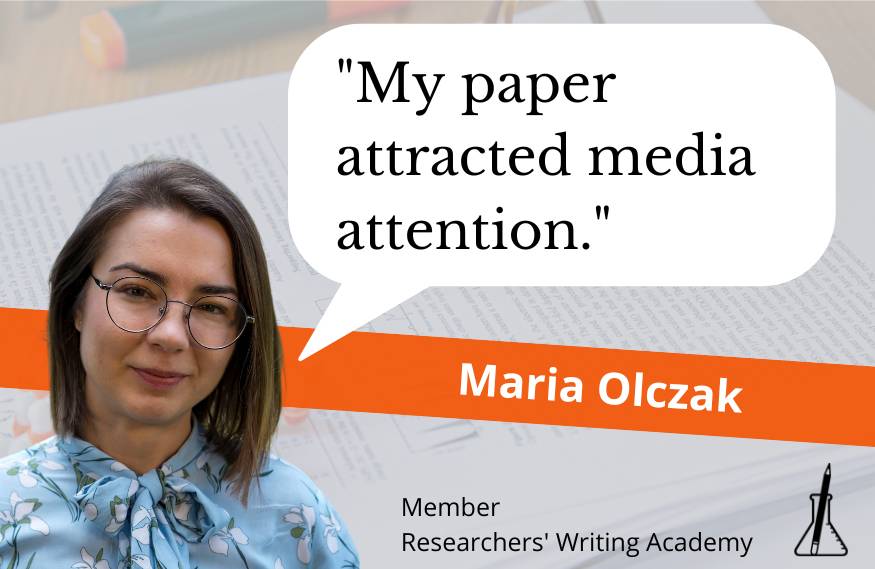Maria Olczak, PhD candidate at Queens Mary University of London, shares her experience in our academic writing program, the Researchers’ Writing Academy.
Hey Maria! What was your motivation to join our academic writing program?
When I joined the course, I already had published the first article of my PhD, so I knew the process more or less. But, I didn’t enjoy it.
In my first paper, we went through a lot of iterations. I just started drafting my article immediately, which was a significant waste of time. I ended up writing and rewriting not really understanding what wasn’t working.
Somehow, I felt that the writing process could be much better. But I wasn’t sure in which order I should be working on different things, or in which order I should structure my paper.
I wanted the process of writing a paper to be as efficient and also as pleasant as possible as it’s such an important part of academic life.
I wanted to improve the process of writing a paper because writing papers is such an important part of the academic life, and I wanted it to be as efficient and also as pleasant as possible. That was my motivation to join the program.

How did you find out about the Researchers’ Writing Academy?
I hadn’t been actively looking for a scientific writing course, but I saw some information about the Researchers’ Writing Academy on Twitter, and clicked on it. I did some research on it, and it sounded like something that I definitely needed. I wasn’t hesitating much before starting the course.
What specific results did you get as a result of joining the Researchers’ Writing Academy?
The most concrete result is my second PhD article that has been just published in One Earth, and the fact that it attracted some media attention. For instance, there were articles written about it in Times Magazine, Reuters, and Chemistry World. It was quite a lot of work, that’s for sure. But, it was really rewarding.
Articles were written about my paper in Times Magazine, Reuters, and Chemistry World.
Congratulations! That’s really impressive.
Thank you. It’s always good to publish a paper that gets noticed. But I think what has happened throughout the course is even more important. I’m more confident now that I know what I’m doing. Having more confidence in the whole process, and the outcome of your writing as a researcher is definitely life-changing for me.
Now I’m super excited to start thinking about how to organise and structure my next paper.
How long did it take you from joining the course to getting your paper published?
I joined in October, and I got my paper published in May the following year. So, it was about 7 months. The peer review process took some time because we had three reviewers but we had a very good editor, the whole communication was super quick. And compared to my previous experience, I would still call it pretty fast. I enjoyed the publishing process a lot.
And how long did it take you to write the paper with the help of the course material?
I think I submitted the paper in January or February, so about three to four months. When I joined the course, I already had a draft of my paper ready, but I basically started from scratch and revised it quite significantly using the Journal Publication Formula.
Oh, that’s fast then!
Yeah, true. And given the fact that I also combined it with my other PhD work, I think that was quite fast.
Really well done!!
Yeah. I never think about it, but I think it’s important to take a moment at least to celebrate small successes.
Definitely! It’s easy to just brush over them, and as you know I’m always reminding people inside the Researchers’ Writing Academy to stop and reflect on what you have accomplished and realise when things are actually going well.
What did you like the most about the Researchers’ Writing Academy?
For me, that’s definitely the Journal Publication Formula, the framework that breaks down how to structure a scientific paper. I also appreciated the fact that the course makes it really easy to get hooked. It’s really well structured and starts with giving you the big picture before it goes into the details of each specific section.
I enjoyed the publishing process a lot.
I also think the flexibility of the program worked really well, because you don’t need to do everything in a very specific order but there are guidelines on what would work best for us. The examples that were given throughout the course were really helpful. What was really cool was that there was minimal information before you were immediately prompted to put it into practice. I think that’s super crucial.
The course makes it really easy to get hooked.
What also has been really helpful for me was the fact that we have these feedback sessions inside the Researchers’ Writing Academy. Usually, when you take an online course, it’s just a huge group of people, it’s never so personalised. What was great was to always have peers inside the program to exchange, and gather feedback from.
In the group, there were researchers who have completely different backgrounds, which helps because at the end of the day, our research will be read by audiences with different backgrounds too. Being aware that we may be talking to people who are not that familiar with the topic, made me make some additional effort to make my paper more accessible.
I used the Scientific Storytelling Framework to write my paper, and when I was preparing for the interviews with the journalists, I followed the same structure with some adjustments. That proves in my opinion that the framework suggested in the course is really good. You can always play with it when you are communicating to different audiences.
The course was really life-changing for me.
Usually, when you take an online course, it’s just a huge group of people, it’s never so personalised.
Note from Anna: If you got curious about the Researchers’ Writing Academy, I recommend watching our free training class (it’s free and takes about 1 hour). 👇🏻

I’m thrilled to hear the course was life-changing for you! What were your aha-moments as you went through the course material?
I had quite a few aha-moments throughout the course. For example, I realised that before joining the Researchers’ Writing Academy nobody ever explained to me what a good paper should look like — even though, I already started my PhD and as a researcher, you’re supposed to publish academic papers. Of course, you can find a lot of information online and you can also look up on journal websites what should be in the Methods, what in the Results section etc. But the Researchers’ Writing Academy is, I think, the only course available that teaches how to get there and how to organise the whole writing process. Before joining, I was always afraid that maybe I’m not writing the paper in the correct order or that I should be doing something else instead.
Before joining the Researchers’ Writing Academy nobody ever explained to me what a good paper should look like.
Another surprise was the fact that once you have your results, you should think about the story that you want to tell. I always considered myself as pretty good with writing, but I think academic writing is something completely different. It was very helpful to understand that you need to have a good story to tell — and only then you are ready to start drafting the paper.
I would have never thought to structure the paper writing process this way on my own.
Yet another thing that I didn’t think was important before taking the course, but I now realise is, especially with the paper I just published, is that it’s part of our job to communicate our results to different types of audiences, and to communicate them in an interesting way — within the academic principles. The course really helped me with that.
I had this tendency to make my papers too long, and now I know that I need to first think about the story, which helps me limit myself and to just stick to the most important information that I want my readers to know. Now I know to give them the right amount of information without overloading them with unnecessary facts.
I would have never thought to structure the paper writing process this way on my own.
What would you say to somebody who can’t decide whether or not to join the Researchers Writing Academy?
I would say, don’t hesitate! For me, it was a very, very good decision to join. My advice would be to try to make the most out of the course by implementing the lessons in a paper you are writing immediately.
Before joining the Researchers’ Writing Academy, did you have any reservations or objections?
When I decided whether to join or not, I wasn’t sure if the course was right for my research field. I got the impression that there are a lot of people from the medical field in it who use mainly quantitative methods. I’m doing something completely different in terms of the topic of my research and the research methods I use.
For me, it was a very, very good decision to join.
So, I thought that maybe it’s not the course for me. But the Journal Publication Formula is really flexible and I think it’s good for almost every single type of academic publication. At the end of the day, it turned out that the course was perfect. I shouldn’t have worried about that.
So glad to hear that! Thank you for taking the time to chat with me about your experience in the Researchers’ Writing Academy.
My pleasure, Anna! I felt like I owe you something because I mean it, the course is really good.
Anna talked to Researchers’ Writing Academy member Maria Olczak. She is a PhD candidate at Queen Mary University of London, UK, with a research focus on policies and technologies to monitor and reduce methane emissions across major man-made sources.
Anna’s note: If you want to know more about the Journal Publication Formula, the method that helped Maria to get her article published and noticed by the media, we got you. We created a whole training that’ll show you exactly what’s included in our academic writing program and help you decide whether it’s the right choice for you.
Just click the orange button below to watch it now (or save for later)!







